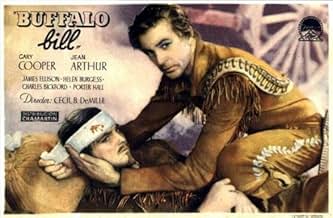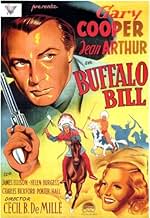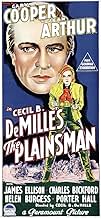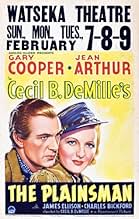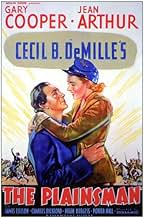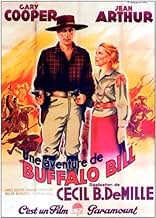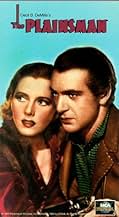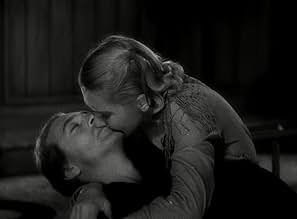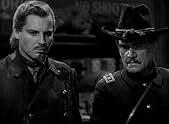ÉVALUATION IMDb
6,8/10
2,6 k
MA NOTE
Wild Bill Hickok tente d'arrêter un soulèvement indien qui a été lancé par des coureurs d'armes blanches.Wild Bill Hickok tente d'arrêter un soulèvement indien qui a été lancé par des coureurs d'armes blanches.Wild Bill Hickok tente d'arrêter un soulèvement indien qui a été lancé par des coureurs d'armes blanches.
- Prix
- 3 victoires au total
Fred Kohler
- Jake - A Teamster
- (as Fred Kohler Sr.)
Pat Moriarity
- Sgt. McGinnis
- (as Pat Moriarty)
Avis en vedette
There were not a lot of Westerns in the 1930s, at least not in the A-budget bracket. So why would that canny marketeer and bandwagon-hopper Cecil B. DeMille decide to make one in 1936? The answer is simple. After the failure of his few dramas in the early talkie period, he vowed to make only "big" pictures, and the Old West was simply another historical arena for grand heroic exploits, just like the crusades or the high seas.
This being DeMille, the idea seems to have been to do a kind of definitive take on the setting. Waldemar Young and Harold Lamb, DeMille's current hacks-du-jour, along with "Oklahoma" playwright Lynn Riggs have created a screenplay that is not so much a cliché-fest as a cosy, sanitised and highly anachronistic snapshot of Western mythology. So we get Wild Bill Hickok, Calamity Jane, Buffalo Bill and General Custer all cheerfully rubbing shoulders like an Old West version of The League of Extraordinary Gentlemen, and banding together against the common enemy (the injuns, of course). DeMille's penchant for historical accuracy may give the sets and costumes a look of authenticity, but does not extend as far as actually portraying Calamity as a drunken prostitute, and Hickok as a kind of 19th-century Lemmy from Motorhead.
The two leads may not look like their historical counterparts, but at least Gary Cooper and Jean Arthur have the rugged demeanour of frontierspeople. They are also good enough performers to do a decent job despite a lack of coaching from DeMille. But as is often the case, the most interesting players are the villains. Charles Bickford looks as if he was chiselled from the buttes of the plains themselves, and gives a performance comparable to Walter Huston's Trampas in the 1929 version of The Virginian. Victor Varconi, once a handsome lead man in the silents, now thanks to his accent and looks reduced to playing all manner of swarthy baddies, is compellingly menacing as Painted Horse. And finally a young Anthony Quinn makes a short but impressive appearance as a Cheyenne warrior, lending a degree of dignity to the natives that is woefully absent in the rest of the picture.
DeMille himself though does not appear to have "got" the genre. Despite the title, we don't really get to see those plains, and there is none of the romance of the outdoor lifestyle that makes classic Westerns what they are. But looking at DeMille's style you can see he is not a fan of empty spaces. Bigness for him means fullness. He really goes to town on the steamboat boarding scene, conjuring up an image of lively bustle with people moving across the frame in layers receding in depth. This is a very effective way of making a place look crowded without having to place the camera too far back or hire out every extra on the books. In other scenes, such as the one where the townspeople threaten to tar and feather Jean Arthur he uses extras to build walls around the action, filling every spare space with people. Even in simpler scenes there tends to be a degree of complexity to the shot, like a classical painting that tries to cram every aspect of an idea onto the canvas. And DeMille's images are often beautiful in a painterly way, but still the lack of "west" on display stops this from feeling like a Western.
Think of this then more as an adventure yarn than a horse opera. It may be silly as silly can be (my favourite daft moment is in the opening scene, when Abe Lincoln's wife bursts into a meeting to remind him he's going to be late for the theatre, followed by a doom-laden chord in the background score), but it is not bad as far as no-brainer entertainment goes. The action scenes are exciting and punchy, largely thanks to the dynamic editing of Anne Bauchens. This is by no means essential DeMille, and certainly not essential Cooper, but is good fun if you happen to catch it.
This being DeMille, the idea seems to have been to do a kind of definitive take on the setting. Waldemar Young and Harold Lamb, DeMille's current hacks-du-jour, along with "Oklahoma" playwright Lynn Riggs have created a screenplay that is not so much a cliché-fest as a cosy, sanitised and highly anachronistic snapshot of Western mythology. So we get Wild Bill Hickok, Calamity Jane, Buffalo Bill and General Custer all cheerfully rubbing shoulders like an Old West version of The League of Extraordinary Gentlemen, and banding together against the common enemy (the injuns, of course). DeMille's penchant for historical accuracy may give the sets and costumes a look of authenticity, but does not extend as far as actually portraying Calamity as a drunken prostitute, and Hickok as a kind of 19th-century Lemmy from Motorhead.
The two leads may not look like their historical counterparts, but at least Gary Cooper and Jean Arthur have the rugged demeanour of frontierspeople. They are also good enough performers to do a decent job despite a lack of coaching from DeMille. But as is often the case, the most interesting players are the villains. Charles Bickford looks as if he was chiselled from the buttes of the plains themselves, and gives a performance comparable to Walter Huston's Trampas in the 1929 version of The Virginian. Victor Varconi, once a handsome lead man in the silents, now thanks to his accent and looks reduced to playing all manner of swarthy baddies, is compellingly menacing as Painted Horse. And finally a young Anthony Quinn makes a short but impressive appearance as a Cheyenne warrior, lending a degree of dignity to the natives that is woefully absent in the rest of the picture.
DeMille himself though does not appear to have "got" the genre. Despite the title, we don't really get to see those plains, and there is none of the romance of the outdoor lifestyle that makes classic Westerns what they are. But looking at DeMille's style you can see he is not a fan of empty spaces. Bigness for him means fullness. He really goes to town on the steamboat boarding scene, conjuring up an image of lively bustle with people moving across the frame in layers receding in depth. This is a very effective way of making a place look crowded without having to place the camera too far back or hire out every extra on the books. In other scenes, such as the one where the townspeople threaten to tar and feather Jean Arthur he uses extras to build walls around the action, filling every spare space with people. Even in simpler scenes there tends to be a degree of complexity to the shot, like a classical painting that tries to cram every aspect of an idea onto the canvas. And DeMille's images are often beautiful in a painterly way, but still the lack of "west" on display stops this from feeling like a Western.
Think of this then more as an adventure yarn than a horse opera. It may be silly as silly can be (my favourite daft moment is in the opening scene, when Abe Lincoln's wife bursts into a meeting to remind him he's going to be late for the theatre, followed by a doom-laden chord in the background score), but it is not bad as far as no-brainer entertainment goes. The action scenes are exciting and punchy, largely thanks to the dynamic editing of Anne Bauchens. This is by no means essential DeMille, and certainly not essential Cooper, but is good fun if you happen to catch it.
After the failure of "The Crusades" at the box office, Cecil B. DeMille stopped doing films about non-American history. His films for the next thirteen years were about our history from Jean Lafitte to World War II (Dr. Wassell). The first in order of production was this film, starring Gary Cooper as Wild Bill Hickok, with Jean Arthur as Calamity Jane. James Ellison was Buffalo Bill, John Miljan (not a villain as usual) was General George A. Custer, and Anthony Quinn was one of the Indians who fought at Little Big Horn. The villains were led by Charles Bickford (selling arms to the Indians) and Porter Hall as Jack McCall (who killed Wild Bill Hickok).
Basically the film takes up the history of the U.S. after the Civil War. Lincoln is shown at the start talking about what is the next step now that Lee has surrendered. Lincoln talks about the need to secure the west (more about this point later). Then he announces he has to go to the theater. That April 14th must have been very busy for Abe - in "Virginia City" he grants a pardon to Errol Flynn at the request of Miriam Hopkins on the same date.
Actually, while Lincoln was concerned about the West, his immediate thoughts on the last day of his Presidency were about reunifying the former Confederate states and it's citizens into the Union as soon as possible. It was Reconstruction that occupied his attention, not the west (except for the problems of Maximillian and his French controlled forces in Mexico against Juarez). But he had been involved in actual problems with the West. In 1862 he sent disgraced General John Pope, the loser at Second Manassas, to Minnesota to put down a serious Indian war by the Sioux (the subject of McKinley Kantor's novel, "Sprit Lake". Pope, incompetent against Lee and Jackson, turned out to be quite effective here, and the revolt was smashed.
However, with all Lincoln's actual attention to western problems, it is doubtful that he says (as Cooper repeats at least once), "The frontier should be secure." There is nothing to say he could not have said it, but it is hardly a profound pronouncement by a leading statesman. Like saying, Teddy Roosevelt said, "Eat a good breakfast every morning for your health." It is not a profound statement of policy. It is, at best, a statement of recognizable fact. Cooper turning it into a minor mantra, like Lincoln's version of the Monroe Doctrine, is ridiculous...typical of the way DeMille's scripts have really bad errors of common sense in them.
However, this is not a ruinous mistake. "The Plainsman" is an adventure film, and as such it has the full benefit of DeMille the film creator of spectacle. As such it is well worth watching. But not as a textbook on Lincoln's political ideas or his quotable legacy.
Basically the film takes up the history of the U.S. after the Civil War. Lincoln is shown at the start talking about what is the next step now that Lee has surrendered. Lincoln talks about the need to secure the west (more about this point later). Then he announces he has to go to the theater. That April 14th must have been very busy for Abe - in "Virginia City" he grants a pardon to Errol Flynn at the request of Miriam Hopkins on the same date.
Actually, while Lincoln was concerned about the West, his immediate thoughts on the last day of his Presidency were about reunifying the former Confederate states and it's citizens into the Union as soon as possible. It was Reconstruction that occupied his attention, not the west (except for the problems of Maximillian and his French controlled forces in Mexico against Juarez). But he had been involved in actual problems with the West. In 1862 he sent disgraced General John Pope, the loser at Second Manassas, to Minnesota to put down a serious Indian war by the Sioux (the subject of McKinley Kantor's novel, "Sprit Lake". Pope, incompetent against Lee and Jackson, turned out to be quite effective here, and the revolt was smashed.
However, with all Lincoln's actual attention to western problems, it is doubtful that he says (as Cooper repeats at least once), "The frontier should be secure." There is nothing to say he could not have said it, but it is hardly a profound pronouncement by a leading statesman. Like saying, Teddy Roosevelt said, "Eat a good breakfast every morning for your health." It is not a profound statement of policy. It is, at best, a statement of recognizable fact. Cooper turning it into a minor mantra, like Lincoln's version of the Monroe Doctrine, is ridiculous...typical of the way DeMille's scripts have really bad errors of common sense in them.
However, this is not a ruinous mistake. "The Plainsman" is an adventure film, and as such it has the full benefit of DeMille the film creator of spectacle. As such it is well worth watching. But not as a textbook on Lincoln's political ideas or his quotable legacy.
This Cecil B. DeMille movie has all the trademarks of that director. It's a big and spectacular look at the Old West. Perhaps there's a bit too much emphasis on creating an epic and not enough on telling a good story.
To be clear, I don't mind that it takes so many liberties with historical facts. When I watch a movie I don't necessarily need a history lesson, and I can forgive a movie taking liberties in order to tell a good story.
However, there is little subtlety and emotional weight in the storytelling. In the first half, things happen to move the story along, without necessarily making much sense.
Gary Cooper, not my favorite among the western genre's big stars, is aloof as Wild Bill Hickok. No one can deny his cinematic presence, though. Jean Arthur brings some fun to her role as Calamity Jane. I have seen some reviewers praising her performance, but the problem is, she never seems convincing. Lead actresses of this era were expected to be beautiful, romantic and sensitive, and that's fine when they play a beautiful, romantic and sensitive woman, which is most of the time. But Calamity Jane? Can we buy Jane Arthur as dissolute, unconventional and wild? The script gives her more to do in this movie than most actresses get in westerns of this period, but she still has to spend the movie mooning after a disdainful Gary Cooper to provide the conventional romance.
I feel like I'm being more negative than the movie deserves. It's just the it doesn't always live up to its ambition. Once you accept that you can't take the story too seriously, you can enjoy it as harmless entertainment. In fact, it finds more focus in the second half of the movie, which is quite fine.
To be clear, I don't mind that it takes so many liberties with historical facts. When I watch a movie I don't necessarily need a history lesson, and I can forgive a movie taking liberties in order to tell a good story.
However, there is little subtlety and emotional weight in the storytelling. In the first half, things happen to move the story along, without necessarily making much sense.
Gary Cooper, not my favorite among the western genre's big stars, is aloof as Wild Bill Hickok. No one can deny his cinematic presence, though. Jean Arthur brings some fun to her role as Calamity Jane. I have seen some reviewers praising her performance, but the problem is, she never seems convincing. Lead actresses of this era were expected to be beautiful, romantic and sensitive, and that's fine when they play a beautiful, romantic and sensitive woman, which is most of the time. But Calamity Jane? Can we buy Jane Arthur as dissolute, unconventional and wild? The script gives her more to do in this movie than most actresses get in westerns of this period, but she still has to spend the movie mooning after a disdainful Gary Cooper to provide the conventional romance.
I feel like I'm being more negative than the movie deserves. It's just the it doesn't always live up to its ambition. Once you accept that you can't take the story too seriously, you can enjoy it as harmless entertainment. In fact, it finds more focus in the second half of the movie, which is quite fine.
This Cecil B. DeMille epic of the old West contains what may be Jean Arthur's finest performance, as a hysterical, eccentric, incurably amoral, but devotedly doting Calamity Jane. She really pulled it off! Gary Cooper is at his most taciturn, but manages some occasional pithy sayings: 'The plains are big, but trails cross ... sometimes.' The story is a pastiche to end all pastiches. All the cowboy heroes of Western lore seem to be in there somehow except for Jesse James. Even Abraham Lincoln opens the story in person (or at least, DeMille would have us believe so). There is no room for anything so evanescent as subtlety, this is a 'stomp 'em in the face' tale for the masses. A remarkable thing about this film however is that it is a very early full frontal attack on what Eisenhower was eventually to name 'the military industrial complex'. It isn't just a story about gun-runners, but about arming anyone for money, and doing so from the heart of Washington. But let's not get into politics, let's leave that to DeMille, who can be guaranteed to be superficial. The chief interest of this film all these years later is that it uses the first film score composed by George Antheil, who has a lot to say about the job in his autobiography, 'Bad Boy of Music'. Antheil seems to have originated 'the big sound' adopted by all subsequent Westerns, whereby the plains sing out with the voices and sounds of countless cowboys in the sky, celebrating the open spaces and interweaving common melodies. That is why it does not sound at all unusual, because we have heard it a thousand times. But he seems to have been the first to summon up the combined rustlings of all the sage brush into this symphony of the open skies which has entered into American mythic lore, and given it a soundtrack which has never varied since then, corny as it may be, but doubtless appropriate. It is amusing to see Anthony Quinn in an early appearance as a Cheyenne Indian. Gabby Hayes is in there somewhere, but you miss him in the crowd. Gary Cooper overtops them all, looming large, - but when did he ever loom small?
The master of movie spectacle Cecil B. De Mille goes West. Using three legends of the old west as its protagonists (they probably never met),Gary Cooper is portraying Wild Bill Hickock,James Ellison as Buffalo Bill and Jean Arthur does make a nice Calamity Jane. The story serves only for De Mille to hang some marvelous action sequences on, like the big Indian attack.Scenes like that are extremely well done.If you don't mind the somewhat over-the-top performances of the cast this is an very entertaining western.Look out for a very young Anthony Quinn essaying the role of an Indian brave who participated at the battle of Little Big Horn.This part got him at least noticed in Hollywood.
Le saviez-vous
- AnecdotesJohn Wayne very much wanted the role of Wild Bill Hickok, which he felt certain would make him a star, but director Cecil B. DeMille wanted Gary Cooper instead.
- GaffesOn the evening of Lincoln's assassination Van Ellyn and his associates are discussing the supposedly then current John Soule editorial, "Go West, Young Man." Lincoln was murdered in 1865. Soule wrote that famous line in 1851.
- Citations
Calamity Jane: Tip your hat when you speak to a lady!
Wild Bill Hickok: I will... when I speak to a lady.
- Autres versionsThe UK DVD is cut by 2 secs to remove a horsefall.
- ConnexionsFeatured in The Hollywood Collection: Anthony Quinn an Original (1990)
- Bandes originalesWhen Johnny Comes Marching Home
(1863) (uncredited)
Written by Louis Lambert
Played as background music for the first scene, Washington, D.C.
Meilleurs choix
Connectez-vous pour évaluer et surveiller les recommandations personnalisées
- How long is The Plainsman?Propulsé par Alexa
Détails
- Date de sortie
- Pays d’origine
- Langue
- Aussi connu sous le nom de
- The Plainsman
- Lieux de tournage
- Cheyenne Indian Reservation, Lame Deer, Montana, ÉTATS-UNIS(Custer's massacre)
- société de production
- Consultez plus de crédits d'entreprise sur IMDbPro
Box-office
- Budget
- 1 000 000 $ US (estimation)
- Durée
- 1h 53m(113 min)
- Couleur
- Rapport de forme
- 1.37 : 1
Contribuer à cette page
Suggérer une modification ou ajouter du contenu manquant


